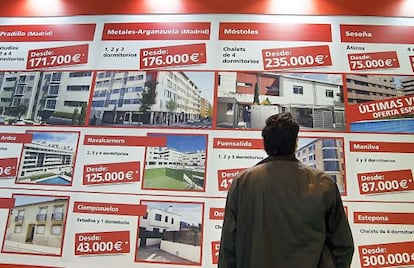Why cash deals rule in real estate
Thanks to a fall in prices, many savers are opting to buy houses outright


Gone are the days when banks were happy to grant 50-year mortgages, and throw in an extra bit of cash to cover furniture and refurbishment. Those conditions were granted back when taking out a home loan meant getting indebted for life. But these days, with the crisis still raging, seven out of every 10 home purchases in Spain are paid in full. Credit has dried up, and most of those properties still being bought up are paid for with savings or donations from family members.
But there is another explanation for all the upfront payments: the rise in foreign buyers, who now represent 17 percent of the total, according to figures from the Public Works Ministry. These international clients are paying with funds of their own or with bank loans secured in their own countries.
Nigel Salmon is the general director of Girasol Homes, a property finder based in Wales that sells homes in Florida, Spain and Portugal. Their clients, he says, are mostly retired folks and people who have been waiting for prices to go down during the last few years, hoping they could finally afford an apartment by the sea. "In the last two years it's gotten a lot easier to sell," he claims. Girasol Homes has listings in the Valencia region, Murcia and Andalusia for as little as 50,000 euros. Buyers are mostly British, Dutch, Belgian, French and Russian nationals, and the majority don't bother taking out a mortgage. "Since they were not able to buy a home during the recession, they had time to save," says Salmon.
Before the real estate bubble burst, upfront purchases represented 37.3 percent of total sales, according to the Higher Council of Notaries. That rate has doubled, and in June it represented nearly 68.6 percent of all sales. A study by Pompeu Fabra University (UPF), based on figures provided by the property chain Tecnocasa, shows that in the first quarter of 2013, just over 60 percent of transactions did not require a home loan.
The trend is not just being seen in Spain. In the United States, more than half of all home purchases in the last 18 months were paid upfront, according to Goldman Sachs. In 2005, these sales represented just 10 percent of the total. The investment bank says this is due to the growing role of investors in the housing market, together with potential buyers' difficulties accessing loans because of restrictive application conditions.
José García Montalvo, a lecturer at UPF in Barcelona, is working on a paper to explain this trend in Spain. The first reason, he says, is "the strong price reduction that allows buyers with some savings to pay without the need for a loan." This price reduction accelerated during the first quarter of the year, and coastal areas that are rife with vacation homes have seen a drop of more than 50 percent in real terms.
Notary statistics show that it is precisely these coastal areas that have been attracting most of the foreign capital. International buyers now represent 36.3 percent of all home buyers in Girona province, 39.9 percent in Málaga and 40.5 percent in Tenerife. "Although transactions fell again in the first few months of 2013, there are provinces such as Alicante, Murcia, Tarragona and Almeria where sales have picked up," says Luis Montes, director general of Grupo Banco Sabadell. Montes explains that his bank's sales to foreign home buyers - over 25,000 units - reached a historic peak in 2012, surpassing 2007 figures. In Alicante, foreign home buyers are already the majority, representing 54.2 percent of all sales.
"Ninety-nine-point-nine percent are foreigners," adds Brigitte Castaño, a realtor at ReMax in Alicante, speaking about her own client base. "There are lots of Belgians, but also French, Swiss, Scandinavian and Russians." These have recently been joined by Algerians, because of the good sea and air connections between Alicante and Oran. "They are mid- to high-class citizens in the liberal professions," says Castaño, adding that nearly all of her clients "pay upfront."
And it's not just the final customers who are buying homes. The UPF study found a lot of "small domestic investors who are buying homes in off-center locations for 70,000 to 80,000 euros." Luis Montes, of Grupo Banco Sabadell, can attest to the return of "the private investor." "This buyer is diversifying his savings by investing in housing, which means a good number of cash transactions," he explains.
Yet the upfront purchases do not merely reflect the arrival of cash-filled foreigners. There is another, less-sympathetic side to the story. "Banks have adjusted their risk parameters and decided to reduce their exposure to the housing sector. That is why it's harder to obtain a mortgage," says García Montalvo in his study.
Ignacio Navas, coordinator at the Housing Observatory of the Superior Notary Council, believes that these numbers "are not good news."
"There are lots of donations, but unfortunately not everyone has access to the NGOs that families have become," adds Montes.
Tu suscripción se está usando en otro dispositivo
¿Quieres añadir otro usuario a tu suscripción?
Si continúas leyendo en este dispositivo, no se podrá leer en el otro.
FlechaTu suscripción se está usando en otro dispositivo y solo puedes acceder a EL PAÍS desde un dispositivo a la vez.
Si quieres compartir tu cuenta, cambia tu suscripción a la modalidad Premium, así podrás añadir otro usuario. Cada uno accederá con su propia cuenta de email, lo que os permitirá personalizar vuestra experiencia en EL PAÍS.
¿Tienes una suscripción de empresa? Accede aquí para contratar más cuentas.
En el caso de no saber quién está usando tu cuenta, te recomendamos cambiar tu contraseña aquí.
Si decides continuar compartiendo tu cuenta, este mensaje se mostrará en tu dispositivo y en el de la otra persona que está usando tu cuenta de forma indefinida, afectando a tu experiencia de lectura. Puedes consultar aquí los términos y condiciones de la suscripción digital.








































